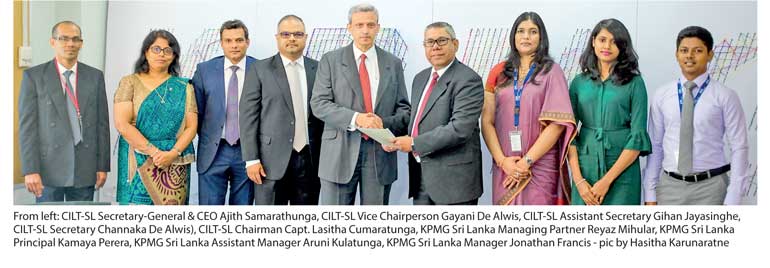Tuesday Feb 17, 2026
Tuesday Feb 17, 2026
Wednesday, 14 February 2018 00:00 - - {{hitsCtrl.values.hits}}
 The Chartered Institute of Logistics and Transport Sri Lanka (CILT-SL) entered into an agreement with KPMG in Sri Lanka to collaborate and conduct knowledge sharing events focused on new and evolving trends, current topics, and to provide access to a community of professionals for both organisations.
The Chartered Institute of Logistics and Transport Sri Lanka (CILT-SL) entered into an agreement with KPMG in Sri Lanka to collaborate and conduct knowledge sharing events focused on new and evolving trends, current topics, and to provide access to a community of professionals for both organisations.
This initiative aims to provide business professionals with practical insights into opportunities and challenges facing industry professionals and businesses today – from risk management and emerging technologies to strategy and global compliance.
Commenting on the collaboration, CILT-SL Chairman Capt. Lasitha Cumaratunga stated: “It is important for professionals to keep abreast of the latest issues and best practices in order to overcome the challenges faced in today’s economic climate. Hence, we are extremely pleased to engage with KPMG, which has a global network of supply chain professionals and resources.”
The initiative includes comprehensive, as well as topic and sector specific events, and a variety of regular and timely workshops and seminars. CILT-SL Secretary Channaka De Alwis stated: “We are committed to providing complimentary guidance and a variety of resources for professional development. It is at the very core of our objective and what we stand for.”
CILT-SL, which was established in 1984, is governed by a Council consisting of professionals representing all segments of the Supply Chain, Transport and Logistics industry, and is among the eight Chartered Institutes forming the body – The Forum of Chartered Institutes (FCI) – whose objective it is to serve common goals for the ultimate benefit of Sri Lanka’s economy.
The Chartered Institute of Logistics and Transport (CILT) is the leading global professional body for everyone who works within supply chain, logistics and transport. The Institute holds unparalleled international recognition and works toward achieving its objective of promoting, encouraging and coordinating the study of the science and art of logistics and transport through its membership, events and educational qualifications. With a global membership of over 33,000, CILT is present in 34 countries across the globe. CILT provides a professional identity to those in the ever-expanding supply chain, logistics and transport industry. It is a strong, active and unified professional body that is able to speak with authority on strategic issues affecting businesses and people in the industry and support their careers.
KPMG Sri Lanka Managing Partner Reyaz Mihular stated: “As Knowledge Partner, our objective goes beyond discussing current and emerging topics, to sharing knowledge on how businesses could respond to emerging issues while promoting best supply chain management practices. In the last few years, KPMG has made significant investments in important areas including our people, technology and innovation, to support the delivery of market leading solutions. One such area is our Supply Chain practice, which is one of the highly sought after advisory services.”
KPMG Sri Lanka’s Supply Chain practice consists of experienced professionals who work together with clients in transforming their traditional supply chains into an integrated multitier supply network - eliminating information latency and unnecessary touch points, reducing operating costs, and improving profitability and customer service. The team also focuses on how disruptive technologies can impact and enhance our local supply chains to meet and be competitive with the global best in class supply chains. The team is headed by KPMG Sri Lanka Principal Kamaya Perera.
Perera stated, “The transport and logistics industry has numerous opportunities, challenges and questions. The industry is confronted with many disrupters poised to revolutionise the industry: digitalisation, new customer expectations and new business models. Together with CILTSL, KPMG looks forward to offering insights and solutions to address the complex needs of businesses and to assist them embrace the current and the future disruptors.”